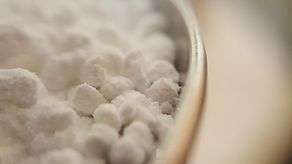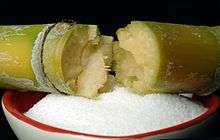Powdered sugar

.jpg)
Powdered sugar, also called confectioner's sugar, icing sugar or icing cake, is a finely ground sugar made by milling normal granulated sugar into a powdered state. It usually contains a small amount of anti-caking agent—usually cornstarch in North America or tricalcium phosphate in other regions—to prevent clumping and improve flow. Although most often produced in a factory, it can also be made by putting normal sugar in a coffee grinder, or crushing it by hand in a mortar and pestle.
In industrial food production, it is used where a quick dissolving sugar is required. Domestically, it is principally used to make icing or frosting and other cake decorations. It is often lightly dusted onto baked goods to add a light sweetness and subtle decoration.
Powdered sugar is available in different degrees of fineness, most commonly XXX, XXXX, and 10X, with more Xs indicating finer grains.[1] With finer particles more moisture is absorbed, which results in caking. An anti-caking agent is generally added during grinding, typically corn starch, or tricalcium phosphate, at 3% to 5% concentration, to absorb moisture and improve flow by reducing contact between sugar crystals.[2][3]
Other Varieties
Caster sugar (also referred to as superfine or baker's sugar) has a larger particle size than powdered sugar, approximately half that of granulated sugar.[4]
Snow powder (or snow sugar) is a non-melting form of icing sugar usually consisting of dextrose, starch and anti-binding agents, useful for retaining its structure when dusted onto cakes or pastries that require refrigeration. It is mostly used for decorative purposes.
See also
-
 Media related to powdered sugar at Wikimedia Commons
Media related to powdered sugar at Wikimedia Commons
References
- ↑ "The Crushing Difference Between Granulated & Confectioners' Sugar". O Chef. Retrieved 2008-01-16.
- ↑ Asadi (2006), 451-452.
- ↑ Chen (1993), 530
- ↑ "C&H Baker's Sugar". C&H Sugar. Retrieved 30 October 2015.
- Asadi, Mosen. Beet-Sugar Handbook. John Wiley & Sons, 2006.
- Chen, James C. P., Chung Chi Chou. Cane Sugar Handbook: A Manual for Cane Sugar Manufacturers and Their Chemists. John Wiley & Sons, 1993.

